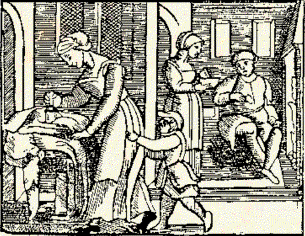In sickness and in health. . .
The housewife was to care for her family both in sickness and in health. Here she irons clothes on the left, and applies a household remedy* to a member of the family on the right.
Many people preferred home medicine to the physicians*.
Footnotes
-
A remedy
Fevers which came at regular intervals -- quotidian (daily), tertian (every second day) and quartan (every third day) -- were usually the results of malarial diseases. Sweating is a symptom of the passing of fever; here the attempt is made to induce the symptom in the belief that it is a cause of the cure rather than an effect.
Of the single tertian For a single tertian fever, or each other day's ague [probably a malarial disease]; take a quart of posset ale, the curd being well drained from the same, and put thereinto a good handful of dandelion, and then, setting it upon the fire, boil it till a fourth part be consumed, then as soon as your cold fit beginneth drink a good draught thereof, and then either labour till you sweat, or else force yourself to sweat in your bed, but labour is much the better provided that you take not cold after it.
-
On apothecaries
And for you, M. Apothecary, alas, I look not once in seven year in your shop, without it be to buy a pennyworth of wormseed to give my child to drink, or a little treacle to drive out the measles, or perhaps some dregs [punningly for drugs] and powders to give my sick horse a drench [dose] withal; but for myself, if I be ill at ease I take kitchen physic; I make my wife my doctor and my garden my apothecary's shop. . .
(Robert Greene, A Quip for an Upstart Courtier: London, 1592.)Several plants were called "wormseed" because they were believed to expel worms from the body.
Click for more on apothecaries.
